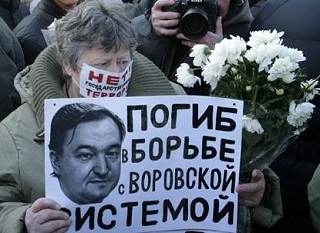U.S. punitive law targets Russian government

Photo: Why this is happening?: A woman holds a sign with a picture of Sergei Magnitsky, at an illegal rally against Vladimir Putin in Moscow, Dec 15. The sign reads 'Dead in the battle against a system of theft.' After the U.S. Congress passed the Magnitsky Bill, punishing Russian officials for the death of Magnitsky, an attorney for a U.S. investment fund who uncovered mass official corruption, Russia's parliament retaliated with this bill, which seeks, to punish Americans in part by prohibiting them from adopting Russian orphans.
The imposition of a Cold war-style law by the United States, the Magnitsky Act, which bars certain Russian officials believed by the United States government to have been responsible for the death of Russian accountant-lawyer Sergei Magnitsky, is a replacement for the Jackson-Vanik Act, which anchored U.S.-Soviet relations to the granting of exit visas for Soviet Jews to move abroad. The Magnitsky Act’s formal name, «Russia and Moldova Jackson-Vanik Repeal and Sergei Magnitsky Rule of Law Accountability Act of 2012», links Magnitsky directly to the repeal of Jackson-Vanik, the latter a bill that gave the Israel Lobby virtual veto authority over every aspect of U.S.-Soviet relations: primarily trade but also disarmament; scientific, technical, and cultural exchanges; and airline landing rights…
Magnitsky’s chief sponsor in the Senate was Democratic Senator Benjamin Cardin from Maryland, a leading member of the pro-Israel caucus in Congress. A Magnitsky-type bill has been introduced in Canada by Liberal Party Member of Parliament Irwin Cotler, another leading pro-Israeli politician. Cardin and Cotler are both Jewish. A Magnitsky law has also been introduced in the British Parliament. The British sponsor is Conservative MP Dominic Raab, who is also Jewish. British co-sponsors include former foreign secretaries Malcolm Rifkind, Jack Straw, and David Miliband, all Jewish. The pattern and reasoning behind the Magnitsky legislation is clear.
The Magnitsky Act bans a list of Russian officials and businessmen from entering the United States or having American bank accounts or owning property in America. The Magnitsky list can also be extended to cover other Russian nationals and there have been calls by the neo-conservative Zionist power circles in Washington to extend the list to Russian President Vladimir Putin and members of the Russian State Duma.
During the Cold War, the Israel Lobby wanted the United States to pressure the then-Soviet Union into granting Soviet Jews the right to emigrate from the Soviet Union to Israel – although many ultimately ended up in the United States directly or via Israel. It was pushed through by the Cold War hawk from Washington State, Senator Henry «Scoop» Jackson, whose senatorial office gave rise to such ardent anti-Soviet neo-conservative officials of the Ronald Reagan administration as Richard Perle, Paul Wolfowitz, and Douglas Feith. Although Jackson-Vanik applied to all non-market economies, it was specifically targeted against the emigration policies of the USSR, although, in 2005, Anti-Defamation League director Abraham Foxman attempted to invoke provisions of the act against Ukraine for anti-Semitic acts in the country.
Even after the fall of the Soviet Union, Jackson-Vanik required the United States to annually certify Russia’s human rights record in order to enjoy another year of trade links with the United States.
Sergei Magnitsky, for whom the American act is named, was a lawyer for Firestone Duncan, a Moscow law firm that represented Hermitage Capital Management co-founded in 1996 by Edmond Safra and Bill Browder, the grandson of the General Secretary of the Communist Party USA Earl Browder. Hermitage was once Russia’s largest foreign portfolio hedge fund. Bill Browder previously worked at the Israel-connected Boston Consulting Group, which once employed Binyamin Netanyahu and Mitt Romney during the same time frame. Hermitage stood charged with violating Russian tax laws and Magnitsky was imprisoned for eleven months of pre-trial detention and died in a Moscow prison on November 16, 2009 after suffering what authorities described as a heart attack. Magnitsky was accused of helping Hermitage defraud Russian tax authorities.
Magnitsky used phantom companies, holding companies, and tax haven firms to hide money. The firms extended from Vladivostok in the Russian Far East to Ukraine, Moldova, Kyrgyzstan, Latvia, Lithuania, Estonia, Cyprus, Belize, British Virgin Islands, United Kingdom, and Dubai. One of the front companies, Prevezon Holdings, Ltd., was 99 percent owned by Israeli «businessman» Denis Katsyv, and 1 percent owned by Martash Investment Holdings Ltd. of the British Virgin Islands, also owned by Katsyv. The Katsyv family has been investigated for the bank laundering scandal involving Israel’s Bank Hapoalim and Mafia figure Lev Leviev. Although the Magnitsky Act applies to anyone who benefitted from Magnitsky’s death, Katsyv owns millions of dollars in New York real estate and conducts Hermitage-related business from Manhattan. The Magnitsky Act apparently has a «Jewish exception» clause.

Photo: Firestorm over Russia's orphans: Russia's parliament, the Duma, has passed a bill in retaliation for an American law which targets Russian officials involved with human rights abuse. The trouble is, the Duma bill, by prohibiting the adoption of Russians by Americans, clearly hurts Russian orphans more than the Americans who wish to adopt them.
Browder was expelled from Russia in 2005 as a national security threat. Hermitage co-founder, the wealthy Brazilian-Lebanese Jew Safra, died in 1999 as a result of a mysterious fire at his residence in Monte Carlo that was later ruled an arson attack.
Browder’s grandfather willingly testified against the activities of the American Communist Party before the Senator Joseph McCarthy Communist «witch hunt» hearings and in 1957 told CBS News’s Mike Wallace that «Getting thrown out of the Communist Party was the best thing that ever happened to me». In the 1950s, there were more FBI informants in the American Communist Party than there were loyal party members.
Only four Russians on the 60-person Magnitsky List were associated with the prison where Magnitsky died. The remainder includes prosecutors and investigators for the Ministry of Internal Affairs, Federal Security Bureau agents, officials of the tax and economic crimes office, judges, and officials from the Republic of Tatarstan. In fact, by putting some 56 Russian law enforcement and judicial authorities on a U.S. banishment list, the only beneficiary is the ubiquitous Russian-Israeli Mafia that has taken over most organized crime activity from Brooklyn to Tel Aviv and Miami to Los Angeles. Russian Jewish Mafiosi crime figures can now rest assured that they won’t have Russian federal law enforcement and tax authorities peeking into their business activities in the United States because the presence of those officials has been banned by President Barack Obama and Congress. Washington precipitously acted on behalf of Russian-Israeli crime figures who travel unchallenged between London, Washington, Tel Aviv, Geneva, and Riga.
Russia responded to the Magnitsky Act by passing its own retaliatory version that not only puts American officials on a banned list but prohibits the adoption of Russian children by American families. It should be pointed out that the Russian-Israeli Mafiosi has become instrumental in the trafficking of children for all sorts of purposes, including the legal but unsavory adoption industry and illegal sex slave trafficking and human organ harvesting. Some U.S. adoptions of Russian children, arranged through fly-by-night criminal enterprises, have resulted in cases of child abuse being committed by the American parents.
Wariness by other countries of America’s unsavory record on foreign adoptions has not only resulted in Russia implementing restrictions on U.S. adoptions but moves have been made by China, Vietnam, Azerbaijan, Belarus, South Korea, Cambodia, Georgia, Romania, Philippines, Ukraine, Sierra Leone, and Thailand to restrict or ban foreign adoptions.
Even during the dark days of Jackson-Vanik, the Russian-Israeli Mafia attempted to game the system. Because of trade sanctions against the USSR and Eastern Europe, American-Israeli Mafiosi figures like fugitive businessman Marc Rich engaged in barter transactions with the Soviets. Barter had other business-oriented names such as «counter trade», «counter-purchase», «compensation», «reciprocal trading», and «parallel transactions». Trade sanctions were by-passed through such barter agreements using counter-trade experts employed by some of the world’s largest banks, including Citicorp, European American Bank, Credit Lyonnais, and Creditanstalt Bankverein. And Rich made a fortune in the counter-trade world by inking lucrative agreements with not only the Soviet Union but also trade sanctioned encumbered Islamic Revolutionary Iran and apartheid South Africa. President Clinton pardoned Rich in an eleventh hour decision before leaving the White House in 2001. Because of Rich’s friends in Tel Aviv, he came off the U.S. government’s criminal «list» as fast as he went on it. Such is the value of American «lists».
Not only are there calls for the U.S. to expand the Magnitsky List to include senior Russian government officials, including those responsible for the prosecution of billionaire tax evader Mikhail Khodorkovsky, another darling of the pro-Israeli Lobby in America, but there is a move for the European Union to adopt its own Magnitsky Act. Barring Russian law enforcement and tax agents from the EU would be yet another god send to the Russian-Israeli Mafia, which wants unfettered business opportunities throughout the EU, even up to Russia’s borders with the Baltic States, Poland, and Finland. The Magnitsky Act was crafted by the Israel Lobby in the United States for the exploitation of the Russian-Israeli Mafia’s illicit activities around the world, all aided and abetted by a criminally-run regime in Jerusalem. The recent indictment of Israeli-Moldovan ex-night club bouncer and former Foreign Minister Avigdor Lieberman is a testament to Israel’s undeniable underworld links.
___________________________________________________________________________________
Wayne Madsen is an investigative journalist, author and syndicated columnist. Has some twenty years experience in security issues. As a U.S. Naval Officer, he managed one of the first computer security programs for the U.S. Navy. He has been a frequent political and national security commentator on Fox News and has also appeared on ABC, NBC, CBS, PBS, CNN, BBC, Al Jazeera, and MS-NBC. He has been invited to testify as a witness before the US House of Representatives, the UN Criminal Tribunal for Rwanda, and an terrorism investigation panel of the French government. A member of the Society of Professional Journalists (SPJ) and the National Press Club. Lives in Washington, D.C. His website is here.
___________________________________________________________________________________
Article published here: Strategic Culture Foundation. Photo 1+2: worldmeets.us
URL: http://www.a-w-i-p.com/index.php/2013/01/07/u-s-punitive-law-targets
























